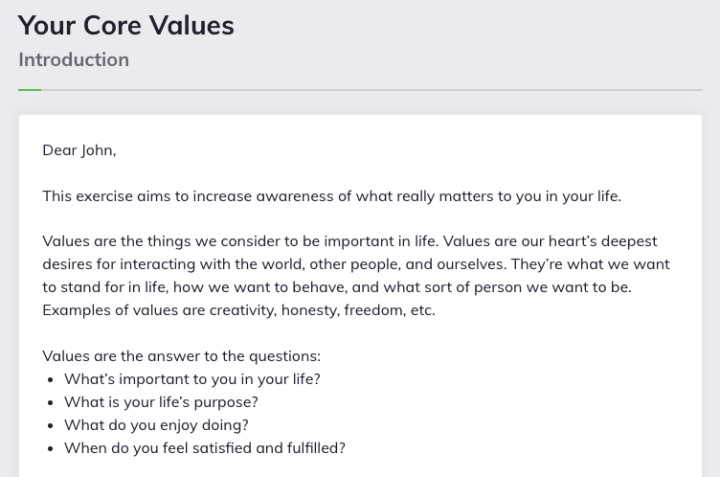Have you ever wondered how some people are able to achieve complete transformational change?
Like, the kind of change where many aspects of a person’s thoughts, behavior, or appearance are no longer recognizable from before.
There are a few names for change of this magnitude: Paradigm shift, quantum leap, and complete reinvention are a few examples.
Yet, in essence, they are all discussing the same thing—personal transformation.
Personal transformation is different from behavior change or skill development. It represents change on a fundamental personal level, where an individual’s core beliefs, values, identity, and purpose all shift in an intentional and enduring way.
Not everyone is seeking such drastic change in their lives. But for those who do, there is a robust framework that can be used to promote high-level personal growth and development: Transformational coaching.
Transformational coaching offers a unique opportunity for individuals to embark on a journey of self-discovery, break through limiting beliefs, and achieve lasting positive change. Most importantly, however, transformational coaching ensures that the goals individuals work toward are those most likely to be personally fulfilling and rewarding over the long term.
If you’re a coach or therapist interested in learning about transformational coaching, everything you need to know will be explained in this article.
We’ll also cover how Quenza, a software platform designed specifically for coaches, can help you inspire massive change in your clients. To try Quenza out today, sign up now for a free full-access 1-month trial.
What Is Transformational Coaching?
With its roots in person-centered (or humanistic) therapy, transformational coaching can be defined as:
A collaborative and holistic process that focuses on creating deep and sustainable change in individuals. It goes beyond surface-level goals and aims to transform core beliefs, values, and behaviors. With such transformation, coachees can transition through the higher stages of adult development and therefore gain greater wisdom and social maturity.
This coaching approach recognizes that true transformation comes from within. It empowers individuals to tap into their inner resources to direct and drive personal growth. They also learn how to make new meanings of experiences and interactions with the world. Through this new sense-making, coachees free themselves of old concepts so as to become new versions of themselves.
In a transformational coaching framework, an individual’s most powerful resource is their ability to reflect and see different viewpoints in order to gain insight. They are grounded by their values but their dreams and desires shift as they transform their views on how interrelated they are with the world. The practitioner helps the client discover the complexity and ambiguity of this world and the endless possibilities that the shades of gray offer. Then, the goal-setting and action-oriented phase of coaching begins.
This is a little different from traditional coaching methods, where goals, behavior change, and learning tend to come first [1].
Rewriting Reality
Unlike other forms of coaching that primarily target specific outcomes or skills, transformational coaching addresses the underlying factors that shape individuals’ beliefs and behaviors.
It aims to help clients:
- Develop a deep understanding of themselves
- Gain clarity about their purpose
- Make conscious choices aligned with their authentic selves
- Gain deeper insight and wisdom
A term often used by transformational coaches to describe both their approach and client outcomes, is “rewriting reality.”[2]
When a transformational coach says they support clients to rewrite their reality, they mean they are facilitating a process of change in which an individual’s core priorities and understanding of the world might shift.
Some transformational coaching examples of rewriting reality include:
- Guiding a client through a process where they understand how low-self esteem has guided their choices in life so far. Then, deciding what their life could look like without these limiting beliefs.
- Taking a step back from working toward goals, so a client can explore the aspects of mindset they might need to cultivate to achieve a deeper level of personal satisfaction and fulfillment in life.
- Helping someone who feels disconnected and dissatisfied with their current work life explore new career possibilities, which they feel passionate about and are aligned with their core values.
- Supporting a client to work through different viewpoints for specific scenarios while looking for hidden dimensions they might not think of such as culture, environmental and other systemic factors.
- Encouraging clients to seek out new ways of finding meaning and purpose outside their normal work and life activities while also learning to step back to reflect on the dynamics at play in these new scenarios.
The Power of Transformational Coaching
There are numerous benefits of transformational coaching. In reality, there are no limits to the ways it can positively impact an individual’s life. And through the process, many clients discover whole new ways of living life and interacting with the world.
To illustrate the power of transformational coaching, we’ve listed the main benefits below. We’ve also included examples of exercises from Quenza’s expansions library, which illustrate various transformational coaching techniques and tools.
Increased Self-Awareness and Self-Discovery
Through introspection and guided reflection, transformational coaching helps individuals gain a deeper understanding of their strengths, values, and opportunities for growth. This heightened self-awareness allows them to make conscious choices aligned with their true selves.
People who live according to their values and strengths tend to experience greater levels of overall well-being [3]. However, many of us have great difficulty actually identifying our core values.
A great place to start transformational coaching is Your Core Values exercise from the Quenza expansions library.
It begins with a thorough explanation of the importance of values.

Then guides the client through a step-by-step process for identifying their core values.
Overcoming Limiting Beliefs and Mindset Shifts
Transformational coaching helps individuals identify and challenge limiting beliefs that hinder their progress. Coaches use powerful questioning techniques and tools to support clients in reframing their perspectives and adopting empowering beliefs and mindsets.
In many ways, transformational coaching techniques focus on the client’s “why.” The approach operates on the assumption that once a person has a strong enough reason for doing something (e.g. when a goal is aligned with a core value), the “how” often comes relatively easily.
Improved Goal Setting and Achievement
Goal setting has long been associated with improved outcomes in behavior change and personal development [4]. But this only applies where the individual is working toward the right goals for them.
Too often, a person can spend months (or even years) working toward a goal that’s no longer aligned with their core values. Or perhaps was never even appropriate in the first place. By assisting individuals in setting meaningful and authentic goals, transformational coaching enhances their clarity, motivation, and commitment.
Quenza has dozens of goal-related exercises in our Expansions library. All of which go far deeper than the standard cookie-cutter goal setting templates you’ll usually find on the web.
For example, our Visualizing Your Goal Activity helps clients harness the power of the imagination to create a vivid, sensory-rich experience of achieving a significant personal goal.

Assigning exercises like this to a client with Quenza is as simple as the click of a button. To test it out for yourself, sign up now for a full-access 1-month free trial.
Enhanced Decision-Making and Problem-Solving Skills
Transformational coaching equips individuals with effective decision-making frameworks and problem-solving strategies. Coaches facilitate the development of critical thinking skills, enabling clients to make informed choices and navigate challenges with confidence.
Because the core of transformational coaching is self-knowledge, which also leads to greater acceptance, coachees can better handle the uncertainty and angst that often accompanies decision-making. They also no longer see decisions as either / or concepts but as opportunities to integrate the positives from all viewpoints. In addition, clients start viewing barriers to their success with curiosity, making it more straightforward to open up possibilities to overcome those challenges.
Strengthened Interpersonal and Leadership Skills
Transformational coaching places importance on understanding and improving relationships.
Coaches assist individuals in enhancing their communication skills, empathy, and emotional intelligence, leading to more fulfilling and effective connections with others. With transformation, coachees move from “I” to “we” with a more collaborative and inclusive approach. For this reason, transformational coaching in the workplace is becoming more common.
A coach may work with employees in a business to redefine and reimagine how they perform their daily work and relate to customers. Organizational coaches also often work with those in management and leadership positions, improving the ability of senior staff to inspire transformational change within their teams.
When transformational leadership is most effective, tends to be when the vision, goals, and values of a leader are clearly communicated. Alongside this “inspirational motivation” are the 3 other transformational leadership pillars: idealized influence, intellectual stimulation and individualized consideration.
Organizational goals should be communicated not just from the perspective of benefits for the business, but also for employees who will be involved in the process (e.g., improved job satisfaction and enhanced ability to meet new performance targets).
Personal Empowerment and Increased Confidence
Through the process of transformational coaching, individuals gain a sense of personal empowerment. They develop the confidence to take risks, embrace change, and live authentically, leading to a more fulfilling and purpose-driven life.
Big, transformational change often comes with a fair dose of fear and uncertainty. And a great way to work through this with clients is an exercise we call Reflecting on Value-Based Decisions.

Qualities of an Effective Transformational Coach
A skilled transformational coach plays a crucial role in guiding individuals through their journey of self-discovery and reinvention. They create a safe and non-judgmental space for clients to explore their thoughts, emotions, and aspirations.
Some key qualities and skills of an effective transformational coach include:
Active Listening – A transformational coach listens attentively to their clients. Not just to their words, but also to their feelings, values, and desires. They create a space for open and honest dialogue, where clients feel heard and understood.
Powerful Questioning – Transformational coaches employ insightful and thought-provoking questions to stimulate self-reflection and foster deeper insights. These questions challenge clients’ assumptions, expand their perspectives, and unlock new possibilities.
Empathy and Compassion – Transformational coaching requires coaches to demonstrate empathy and compassion towards their clients. By creating a supportive and non-judgmental environment, coaches build trust and establish strong coaching relationships.
Intuition and Emotional Intelligence – Transformational coaches rely on their intuition and emotional intelligence to sense underlying emotions, patterns, and dynamics. They are attuned to their client’s needs and use this awareness to provide relevant support and guidance.
Goal-Oriented Approach – While transformational coaching emphasizes personal growth and self-discovery, coaches also assist clients in setting specific and measurable goals. Once a client is clear on their values and priorities, a transformational coach helps individuals align their goals with their values and provides structure to track progress effectively.
4-Step Transformational Coaching Framework
While there is certainly room for practitioner and client variation, transformational coaching typically follows a structured process to facilitate meaningful change.
- Assessment and Goal Identification
One of the biggest differences between transformational coaching vs traditional coaching is the extended amount of time spent in the assessment phase. This is because, for a transformational coach, identification of the right goal is the most important part of their practice.
A quote attributed to the late, great Stephen Covey illustrates the importance of choosing the right goal:
“If the ladder is not leaning against the right wall, every step we take just gets us to the wrong place faster.”
― Stephen R. Covey
Therefore, in the initial phase of transformational work, the coach and client collaborate to assess the client’s current situation, identify strengths, and explore areas for development. Then, they work together to set clear and meaningful goals that align with the client’s values and aspirations.
With Quenza, you can streamline your assessment processes by using the drag-and-drop form-building feature to create your own custom intake assessment forms. If you want to get a head start, you can use one of our ready-made coaching forms as is, or customize them to your needs.
A great coaching worksheet from our Expansions Library to use in the assessment phase is The VIA Classification of Character Strengths & Virtues.

By the end of the Activity, clients have gained valuable insights about what signature strengths they possess, and what to focus on during coaching.
To get access to forms like this right away, sign up now for a full-access 1-month free trial of Quenza.
Not only will this let you use the 120+ exercises and tools in our Expansions Library. You’ll also get a full practice management system for coaching, where you can securely store client notes, run group coaching programs, and even create your own online courses.
- Creating an Individualized Coaching Plan
Transformational coaches develop a tailored coaching plan based on the client’s goals, preferences, and unique circumstances. This plan outlines the coaching framework, timeline, and specific strategies to be employed throughout the coaching journey.
The plan for a transformational coaching client should always be completely individualized.
Remember, the goal is for the person to develop their unique path to achieving what they really want out of life. Not to rush ahead and work towards goals that they may not find valuable in the years to come.
- Implementing Coaching Strategies and Techniques
A range of strategies and techniques are used by transformational coaches to support their clients’ growth. These may include coaching tools like:
- Visualization exercises
- Journaling
- Guided reflections
- Accountability structures
- Action-oriented tasks
- Monitoring Progress and Adapting the Coaching Plan
The best transformational coaches continuously monitor the client’s progress and provide feedback and support. They assess the effectiveness of coaching strategies, adapting the coaching plan as necessary to ensure the client remains on track toward their goals.
This is an area many coaches (transformational and otherwise) struggle. Most often because they put all their energy into planning and delivering sessions, not leaving any time or brainpower for evaluation.
Fortunately, Quenza has you covered when it comes to monitoring progress.
Not only can you track and manage your client’s results in real time.

The Importance of Success Stories
Sharing real-life case studies and success stories with clients can offer valuable insights into the transformative power of coaching.
By using these examples, you can highlight how individuals have overcome challenges, achieved personal breakthroughs, and experienced positive change through transformational coaching.
This helps to broaden a client’s understanding of what could be possible in their life. Giving them the confidence to dream of something bigger and more meaningful. Rather than playing small or staying stuck in the way they might currently be living their life.
When sharing success stories with a client, try to make them as relatable as possible. You can use examples from your practice, find inspiring stories online, or develop your own hypothetical case studies.
Choosing the Right Transformational Coach
If you’re a client seeking a transformational coach, it’s crucial to find someone who aligns with your needs, values, and coaching style preferences.
The 3-step process below will help you choose the right person to support you in building the life of your dreams.
- Research and Evaluate Potential Coaches
Conduct thorough research to find transformational coaches with relevant qualifications, certifications, and experience. For example, if you’re looking for transformational coaching in education, choose a practitioner with specific experience in this area.
To conduct your research, review websites, testimonials, and a practitioner’s online presence to gain insights into any potential coach’s approach, philosophy, and success stories.
- Don’t Forget Practical Considerations
While it’s always wise to go with an experienced coach with a track record of success, you will also need to weigh up certain practical considerations.
Factors such as coaching fees, availability, location, and compatibility can contribute to the effectiveness of transformational coaching. It’s also important to have a strong rapport and feel comfortable working with the coach, as trust and open communication are vital for a successful coaching relationship.
- Utilize Coaching Associations
Explore professional coaching associations, directories, and online platforms that connect coaches and clients. These resources often provide comprehensive profiles and search filters to help you find a suitable transformational coach.
One of the best parts of these platforms is that they usually only include certified coaches. This means you can be confident you’re choosing someone with the skills and experience required to help you achieve true personal transformation.
Final Thoughts
Transformational coaching offers a powerful means of unlocking a person’s full potential. It helps people achieve big personal and professional growth, through living a purpose-driven life.
By utilizing increased self-awareness, mindset shifts, goal setting, and the support of a skilled transformational coach, individuals can leverage coaching to navigate challenges, overcome limitations, and experience profound and lasting transformation.
No matter what area of coaching you’re working in, skills in transformational coaching can benefit your clients. These tools and techniques can be equally as effective in working through the assessment and goal setting phase with a new client, as they are in helping individuals whose progress has stalled. A transformational approach can even assist those who are feeling lost and dissatisfied with life overall.
To fast-track your ability to offer transformational coaching, sign up now for a full-access 1-month free trial of Quenza.
You’ll be able to instantly use hundreds of proven tools and activities for inspiring massive change. Plus, the trial includes access to our full practice management software solution, designed specifically for coaches.
References
- ^ Ives, Y. (2008). What is 'coaching'? An exploration of conflicting paradigms. International Journal of Evidence Based Coaching and Mentoring, 6(2), 100.
- ^ Wilson, V. (2023). What is transformational coaching? Exceptional Futures. https://www.exceptionalfutures.com/what-is-transformational-coaching/.
- ^ Bojanowska, A., & Urbańska, B. (2021). Individual values and well-being: The moderating role of personality traits. International Journal of Psychology, 56(5), 698–709. https://doi.org/10.1002/ijop.12751.
- ^ Epton, T., Currie, S., & Armitage, C.J. (2017). Unique effects of setting goals on behavior change: Systematic review and meta-analysis. Journal of Consulting and Clinical Psychology, 85(12), 1182–1198. https://doi.org/10.1037/ccp0000260.

